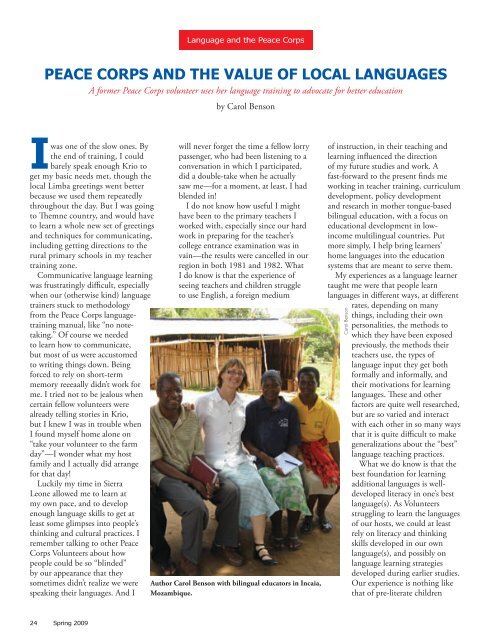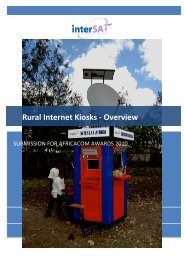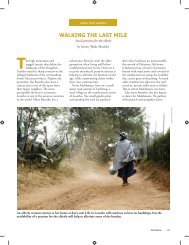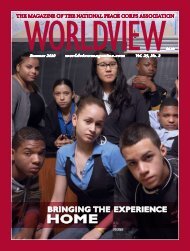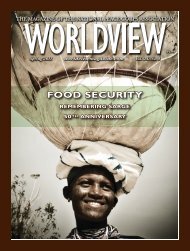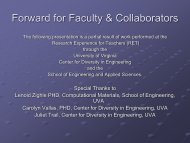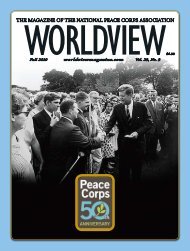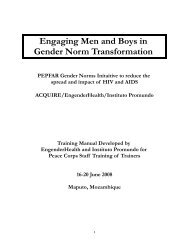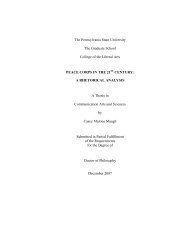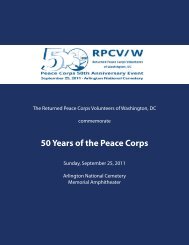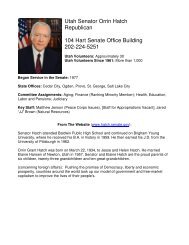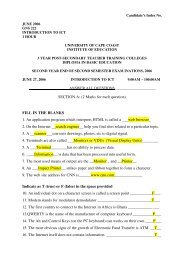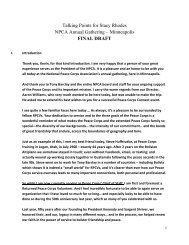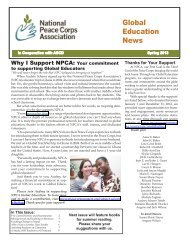special issue: inauguration 2009 - National Peace Corps Association
special issue: inauguration 2009 - National Peace Corps Association
special issue: inauguration 2009 - National Peace Corps Association
Create successful ePaper yourself
Turn your PDF publications into a flip-book with our unique Google optimized e-Paper software.
Language and the <strong>Peace</strong> <strong>Corps</strong><br />
PEACE CORPS AND THE VALUE OF LOCAL LANGUAGES<br />
A former <strong>Peace</strong> <strong>Corps</strong> volunteer uses her language training to advocate for better education<br />
by Carol Benson<br />
Iwas one of the slow ones. By<br />
the end of training, I could<br />
barely speak enough Krio to<br />
get my basic needs met, though the<br />
local Limba greetings went better<br />
because we used them repeatedly<br />
throughout the day. But I was going<br />
to Themne country, and would have<br />
to learn a whole new set of greetings<br />
and techniques for communicating,<br />
including getting directions to the<br />
rural primary schools in my teacher<br />
training zone.<br />
Communicative language learning<br />
was frustratingly difficult, e<strong>special</strong>ly<br />
when our (otherwise kind) language<br />
trainers stuck to methodology<br />
from the <strong>Peace</strong> <strong>Corps</strong> languagetraining<br />
manual, like “no notetaking.”<br />
Of course we needed<br />
to learn how to communicate,<br />
but most of us were accustomed<br />
to writing things down. Being<br />
forced to rely on short-term<br />
memory reeeaally didn’t work for<br />
me. I tried not to be jealous when<br />
certain fellow volunteers were<br />
already telling stories in Krio,<br />
but I knew I was in trouble when<br />
I found myself home alone on<br />
“take your volunteer to the farm<br />
day”—I wonder what my host<br />
family and I actually did arrange<br />
for that day!<br />
Luckily my time in Sierra<br />
Leone allowed me to learn at<br />
my own pace, and to develop<br />
enough language skills to get at<br />
least some glimpses into people’s<br />
thinking and cultural practices. I<br />
remember talking to other <strong>Peace</strong><br />
<strong>Corps</strong> Volunteers about how<br />
people could be so “blinded”<br />
by our appearance that they<br />
sometimes didn’t realize we were<br />
speaking their languages. And I<br />
will never forget the time a fellow lorry<br />
passenger, who had been listening to a<br />
conversation in which I participated,<br />
did a double-take when he actually<br />
saw me—for a moment, at least, I had<br />
blended in!<br />
I do not know how useful I might<br />
have been to the primary teachers I<br />
worked with, e<strong>special</strong>ly since our hard<br />
work in preparing for the teacher’s<br />
college entrance examination was in<br />
vain—the results were cancelled in our<br />
region in both 1981 and 1982. What<br />
I do know is that the experience of<br />
seeing teachers and children struggle<br />
to use English, a foreign medium<br />
Author Carol Benson with bilingual educators in Incaia,<br />
Mozambique.<br />
of instruction, in their teaching and<br />
learning influenced the direction<br />
of my future studies and work. A<br />
fast-forward to the present finds me<br />
working in teacher training, curriculum<br />
development, policy development<br />
and research in mother tongue-based<br />
bilingual education, with a focus on<br />
educational development in lowincome<br />
multilingual countries. Put<br />
more simply, I help bring learners’<br />
home languages into the education<br />
systems that are meant to serve them.<br />
My experiences as a language learner<br />
taught me were that people learn<br />
languages in different ways, at different<br />
rates, depending on many<br />
things, including their own<br />
personalities, the methods to<br />
which they have been exposed<br />
previously, the methods their<br />
teachers use, the types of<br />
language input they get both<br />
formally and informally, and<br />
their motivations for learning<br />
languages. These and other<br />
factors are quite well researched,<br />
but are so varied and interact<br />
with each other in so many ways<br />
that it is quite difficult to make<br />
generalizations about the “best”<br />
language teaching practices.<br />
What we do know is that the<br />
best foundation for learning<br />
additional languages is welldeveloped<br />
literacy in one’s best<br />
language(s). As Volunteers<br />
struggling to learn the languages<br />
of our hosts, we could at least<br />
rely on literacy and thinking<br />
skills developed in our own<br />
language(s), and possibly on<br />
language learning strategies<br />
developed during earlier studies.<br />
Our experience is nothing like<br />
that of pre-literate children<br />
Carol Benson<br />
24 Spring <strong>2009</strong>


